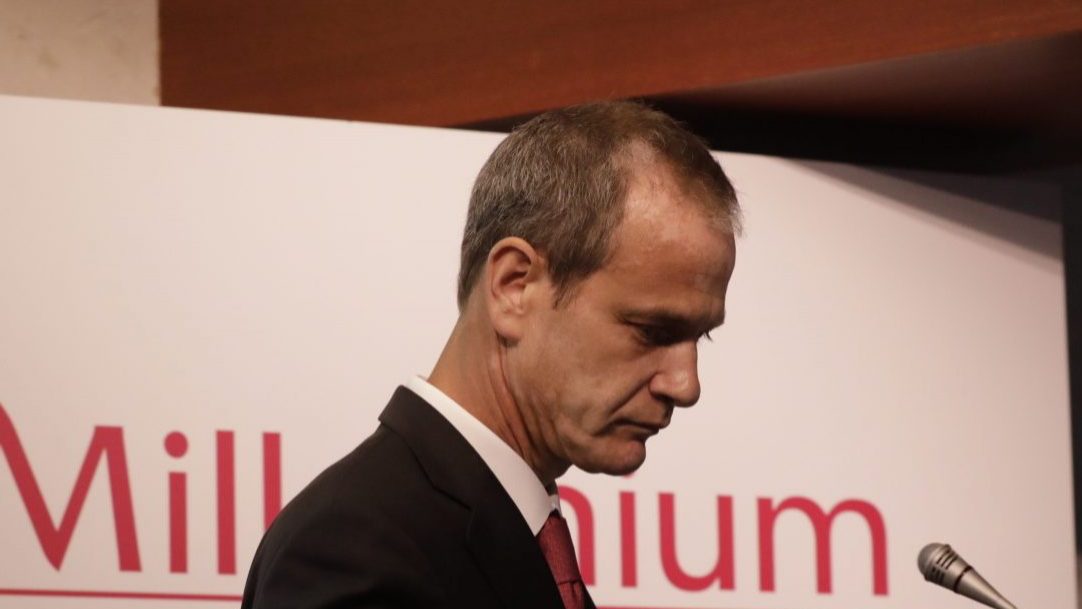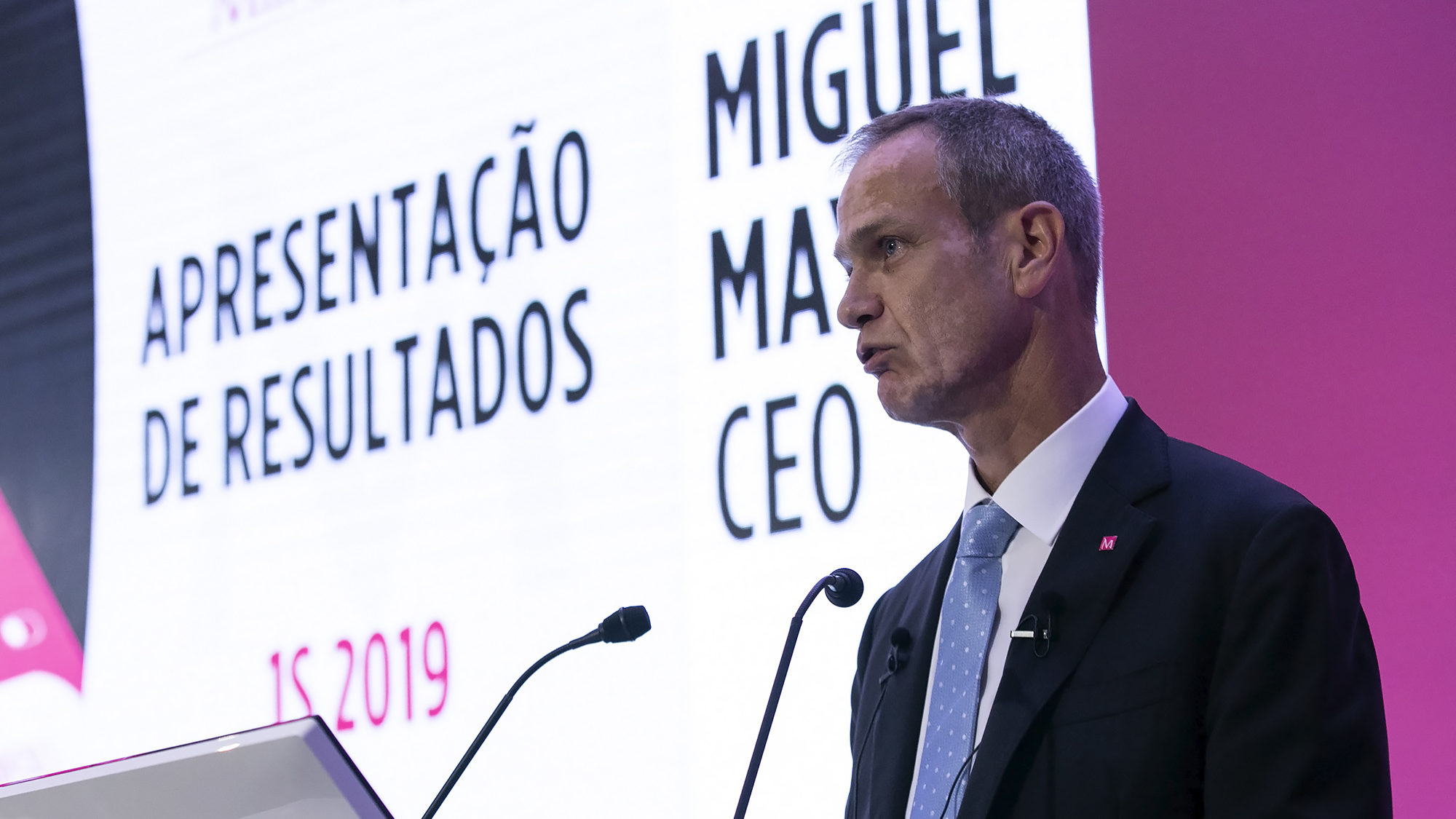Reducing workforce ‘was the most difficult decision we have ever taken’ at BCP
BCP's CEO says cutting workers was the most difficult decision he had to make, but it could not be delayed. And he "would like to see a more nonconformist civil society."
Miguel Maya, CEO of Millennium BCP, is one of the nominees in the category of best CEO in investor relations in the 33rd edition of the Investor Relations and Governance Awards (IRGAwards). In an e-mail interview, the manager says that the reduction of the bank’s staff was the most difficult decision that the executive committee had to make, but that the “responsibility to ensure the bank’s sustainability and to act in defence of all its stakeholders” does not allow “projecting the future based on unrealistic scenarios, as if there were no consequences of not acting in time”.
Looking back at the challenge that the pandemic posed to him as an administrator, he stresses that this crisis was different because “the uncertainties and ambiguities were enormous. The ability to react, to adapt, to analyse the multiple and often inconsistent information showed the importance of management diversity, the robustness of processes and of shared and participatory management,” considers Miguel Maya.
Miguel Maya, who joined BCP in 1996 through the merger with Banco Português do Atlântico, chooses digital transformation as the main change the bank had to undertake.
What was the greatest challenge BCP had to face in the last year and a half?
There were two because they are two issues of enormous importance in the bank’s life, one general and the other more specific. The first was dealing with a context of enormous unpredictability and high risks, such as the one we are experiencing right now.
An administrator is prepared to decide based on the information analysis, data, as deep as the subject deserves, knowing that the information is rarely absolutely complete, but should always be reasonably sufficient and reliable to support the decisions. In this crisis it was different, decisions were necessary, but the uncertainties and ambiguities were huge. The ability to react, to adapt, to analyse the multiple and often inconsistent information showed the importance of management diversity, the robustness of processes and of shared and participatory management. Although it is nothing new to know that BCP has excellent professionals at all levels of the organisation, the truth is that I was surprised by the agility, capacity of adaptation and communication that the bank showed.
The other great challenge we had to face was, without a doubt, the implementation last June of a structured process of downsizing BCP’s workforce. I consider that it was a very difficult decision, the most difficult we have ever taken, as we are fully aware of its impact on the lives of the people covered by it, but our responsibility to build the future, to ensure the Bank’s sustainability and to act in defence of the interests of all its stakeholders, including BCP’s employees, does not allow us to project the future based on unrealistic scenarios, as if there were no consequences of not acting in time, nor to procrastinate necessary decisions however difficult they may be.
The adequacy of the bank’s structure to a context in strong change, which has substantially altered the way of operating in the financial sector, was a process that was already anticipated as necessary before the pandemic but that was accelerated by technological evolution and by the way customers changed their interaction habits with the financial system, including the new financial services operators.
What did the pandemic and the adversities of this period change in BCP?
The pandemic had a very strong impact on people’s lives, imposing periods of generalised lockdown and relevant restrictions that affected interactions between people and covered most economic activity sectors, in some cases even forcing them to stop. But the adversities of the pandemic also acted as an accelerator in the trend towards economic digitalisation. In a few months, there was a generalised adoption of digital routines by consumers, precipitating a trend that was estimated to take several years to be assimilated, with repercussions in the change of customers’ expectations (demanding quicker and more personalised responses) and in the operating and working models of companies.
As a result of the investments already made in the digital transformation of the business model, the adaptation of the organic structure, the training of staff and the automation of processes, BCP was prepared to react effectively to the main challenges we faced. Even in the most difficult periods of the pandemic crisis, we continued to provide face-to-face customer service in branches. We suddenly moved to a model of intensive teleworking, which reached 90% in the central areas, without affecting quality, service level or security in customer service. The collaborative work and professionalism of the bank’s teams were remarkable.
In the initial period when uncertainty and the impacts of the pandemic affected customers the most, BCP showed enormous agility in the way it was able to put the bank’s technology and digital skills at the service of customers, individuals and companies, namely by using automation and digital platforms to provide funds from helplines and implement solutions that mitigated the effects of the drop in activity. It made a lot of difference that we are a relationship bank that is close to its customers. Our leadership in placing the so-called Covid lines was not the work of chance or robots; it was the result of the quality of the bank’s professionals and the importance for customers to work with a bank where they are not just another name or number; a bank that is fully aware that its success can only be achieved if it is aligned with the interests of its customers.
What has been your main lesson as a leader?
These have been very educational times. In this crisis, I improved my ability to work with high levels of uncertainty and ambiguity and to timely adjust decisions according to the team’s reading of the context’s evolution. It became even more evident that the quality and diversity of the management team is determinant and that the existence of well-structured processes and governance models becomes even more important in contexts of strong ambiguity and unpredictability, because, contrary to what many managers think (that formal processes take away agility), What happens is that having well-defined processes creates effective conditions to quickly make well-structured and coherent decisions.
The theme of this year’s edition of the IRGAwards is the focus of business management on human and sustainable characteristics. Do you agree that generating returns for shareholders should go hand in hand with returns for society in what is the purpose of companies?
Companies have a decisive role in society, starting with the economic component through the generation and propagation of prosperity, but also in the social and environmental components, committing to act in favour of the balanced and sustainable development of the communities where they are located.
We have the responsibility to ensure that the next generations will also have a viable planet and that life in society is more balanced and healthy, stimulating talent and entrepreneurship but at the same time protecting the most disadvantaged. All stakeholders, including shareholders, will benefit from companies that contribute on several levels (environmental, social and governance) to the progress of the community as a whole. But we must never forget that profitability is inseparable and indispensable for a company to effectively and sustainably share value with society.
If you had to choose the main transformation carried out by Banco Comercial Português in the last few years, what would it be?
I would highlight the digital transformation that BCP has been carrying out since 2018, which has not only allowed us to compete on an equal footing with “digital native” operators but has also earned strong recognition from customers, who repeatedly choose our app as the best in the market. It is fascinating and challenging to work in an innovative bank that is leading this transformation in the Portuguese financial market. I believe that the transformation of our business model, where digital cohabits in a symbiotic way with personalised and high-quality human service, is something that distinguishes us and will continue to distinguish us in the future. In more holistic terms, I would highlight the profound adaptation of the business model and governance mechanisms, which ensure that we are able to progress and win in a highly competitive context.
And what is the biggest transformation you would like to see Portugal make?
I would like to see a civil society that is more non-conformist, more demanding of the government and the functioning of institutions in order to promote a business environment that encourages entrepreneurship and the creation of competence centres in Portugal and that simultaneously shows more solidarity in order to strengthen the social network of protection for the most disadvantaged.
We must give more support to the entrepreneurial fabric at all levels, small, medium and large companies, with demand and transparency, without rents or specific national barriers (fiscal, labour, etc.), which are not only inappropriate, but also harmful in the global market in which we operate. Companies, together with education, have a decisive role in social development and this must be assumed without complexes by the Portuguese society and its institutions. I am not talking about centres of decision, I am talking about poles of empowerment and retention of talent.
I consider it essential that we focus on the opportunities and advantages that Portugal has or can effectively develop. It is up to us to do everything within our reach to make even better and more balanced use of the country’s resources. It is very important that the country takes advantage of the Resilience and Recovery Plan to ensure that we have differentiating competencies in viable areas and activities with a future. I am confident that we will succeed in improving the business environment, in promoting greater social balance and in developing the competitive advantages to project Portugal in a global world.


